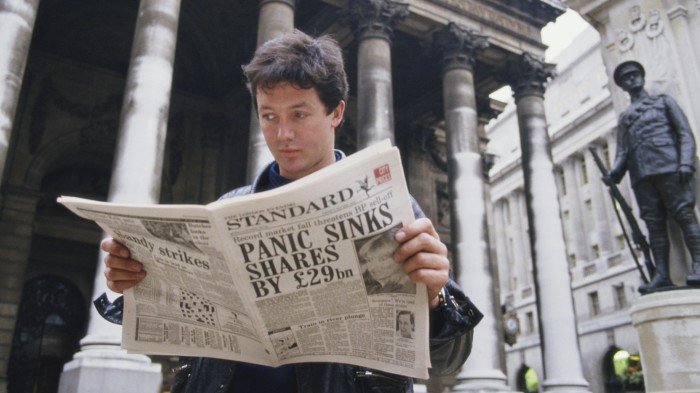Two weeks on from the Spring Statement and Rachel Reeves’ declared ambition to “boost the culture of retail investment” in the UK looks spectacularly badly timed.
The US president’s quixotic tariff announcements caused big losses for investors, with UK, US and global equity markets plunging, before whipsawing back after Trump announced a 90-day pause on some of the planned levies.
Perhaps it is unfair to point this out, given that the odd stock market crash is all part of the rollercoaster ride that seems to lead inexorably — at least in the long term — to higher returns. After all, haven’t we been here before? Whenever global equities have fallen in recent decades — going back to “Black Monday” in 1987 — haven’t they always recovered, and sooner rather than later?
The conventional investment wisdom says that risk declines the longer you hold equities, and is very low over long periods. Pundits and financial advisers talk about the need for “patience” to “smooth” the ups and downs of equities, but say that “in the long run” you will (almost) always win, because long-term equity returns are “mean-reverting”. After all we have a hundred years of market numbers showing equities have outperformed bonds over (just about) any long period.
But what about the universal disclaimer that “past performance is no guarantee of future results”? Forget about actual historical results, what about possible future results?
In 1997 the Nobel laureate Paul Samuelson suggested a thought-experiment on possible outcomes of future equity returns over a 20-year investment period. Write down on 1,200 pieces of paper the percentage monthly equity returns for the past 100 years and put them in a (big) hat.
Pull out at random 240 pieces of paper, representing possible monthly outcomes over 20 years. But, crucially, after each draw put the piece of paper back in the hat, so that it can be drawn again, if it comes up. For most 20-year outcomes, equities will certainly beat boring bonds, but there are many where they will lose, and some where they will lose big time.
If equity returns are just a “random walk” then the higher expected return of equities versus bonds is just the reward for the risk of holding equities, not a “loyalty bonus” for long-term investors.
Mean reversion versus random walk may seem a bit academic, even for FT readers trying to do the best with their money. So let’s be more practical, and accept, for the moment, that holding equities for the long-term really does mean you will nearly always win.
If this really is true, then, surely, investment firms would be keen to offer, say, 20-year equity funds, guaranteed to at least match today’s 20-year annual gilt yield of, say, 5 per cent. Investors would receive the actual equity returns compounded over 20 years, on a stock index, including reinvested dividends. But they would be protected against underperformance, receiving a guaranteed 5 per cent a year, at the end of 20 years, even if equities returned less than this.
Because — we are told — the risk of equity underperformance is modest, then investment firms would charge a modest upfront fee for the guarantee.
Any firm selling this fund would have people queueing round the block, so why isn’t it offered in the UK, the US or anywhere else?
The answer is simple. The cost to the investment firm of hedging a 20-year equity guarantee is very high, because the underlying risk is very high, so the fee charged to investors must also be very high.
The guarantee amounts to the firm selling a 20-year equity “put” option to investors. The buyer of a put option is purchasing the right — but not the obligation — to sell shares at a stated “strike price” at an agreed future date. (Private investors can buy equity put options on the FTSE 100 for up to two years).
So if in 20 years’ time the equity index is lower than the agreed strike price — fixed on day one by reference to 20-year gilts yields — the investor will exercise the option and claim under the guarantee.
Investment banks have been pricing and selling equity long-dated put options to institutions for many years, and the underlying Black-Scholes pricing mechanism — with tweaks — has been used for decades in pricing all sorts of financial transactions — and the people behind it won the 1997 Nobel Prize.
The theoretical price — and the actual prices charged by banks — is about 30 per cent for 20 years. So a guarantee for £100,000 of equities that would return at least the current yield on 20-year gilts would cost around £30,000 on day one.
It is not that I think retail investors should hold fewer equities, or more bonds for that matter — but I do think we ought to be very wary about the claims made for stocks. Because the assertion that equity risk declines with time seems to me to be a con.
The proper measure of long-term equity risk is not past performance, nor the volatility of past returns on shares. Instead it is the real-world cost of buying insurance against future underperformance of shares.
This should be the acid test for retail investors. After all, why are the firms that push the mantra that “equities always outperform in the long run” not prepared to put their money where their mouth is, and offer a cheap guaranteed equity product?
John Ralfe is an independent pensions consultant. X: @johnralfe1
